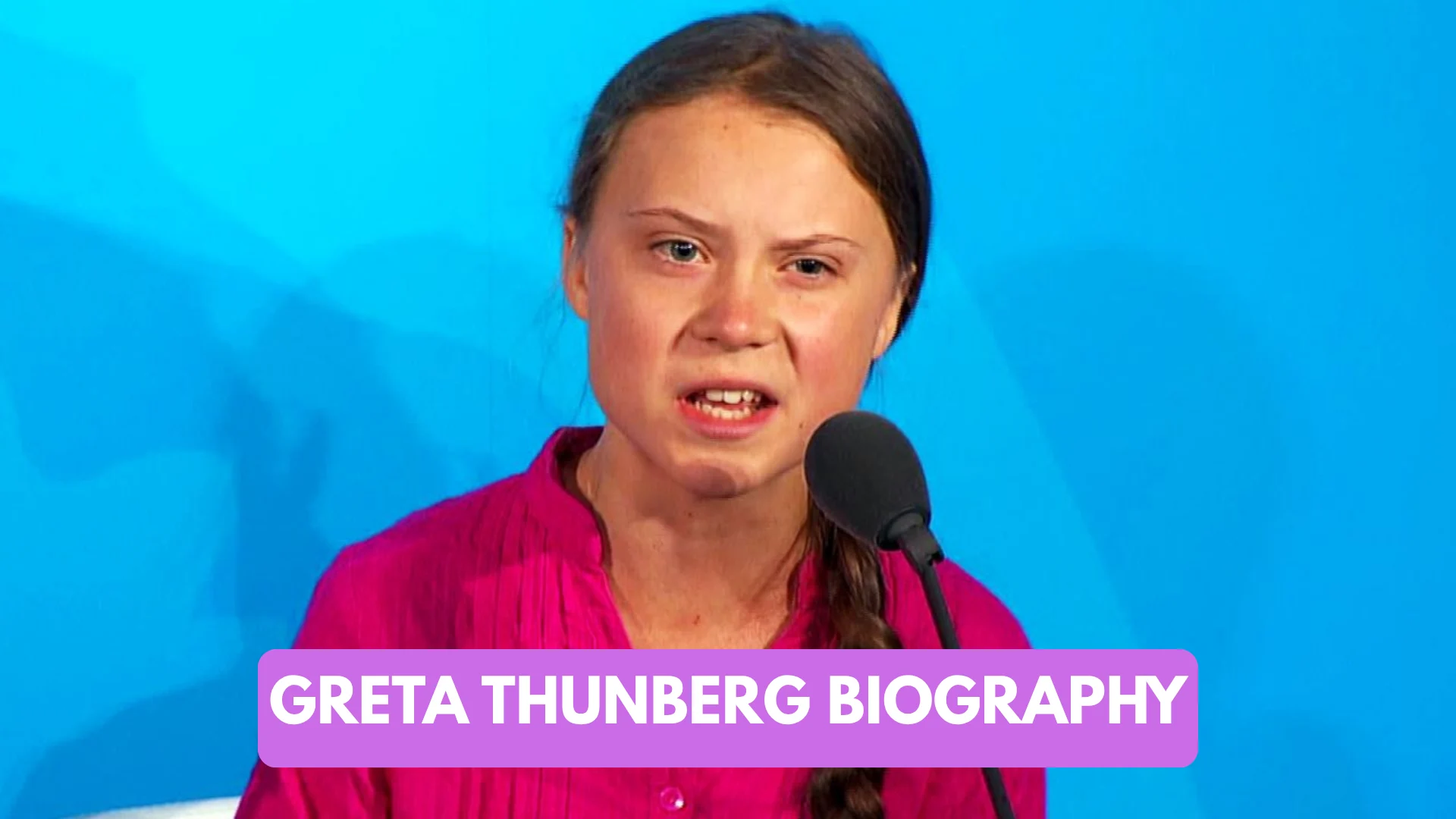
Greta Thunberg has become one of the best-known faces of climate activism in the 21st century. What began as a solitary school protest outside the Swedish parliament has grown into a global movement—Fridays for Future—driven largely by young people demanding urgent action to limit climate change.
This biography explores her early life, how she started striking for climate, the speeches and actions that made her a household name, the recognition and controversies she’s faced, and her ongoing impact.
Early Life and Family
Greta Tintin Eleonora Ernman Thunberg was born on 3 January 2003 in Stockholm, Sweden. She is the daughter of opera singer Malena Ernman and actor Svante Thunberg. Growing up in an artistic household exposed her to public life early, though Greta herself described being a quiet child who internalized much of what she learned about the climate crisis.
Diagnosed in childhood with Asperger syndrome, obsessive-compulsive disorder (OCD), and selective mutism, Greta has described her Asperger’s as a trait that helps her see things in “black and white” and stay focused on what she considers urgent problems.
Awakening: Learning About Climate Change
Greta says she first learned about climate change at a young age and found the slow pace of political response disheartening. By 2018 she had persuaded her family to adopt low-carbon lifestyle changes, including avoiding air travel and reducing meat consumption. That personal commitment set the stage for something larger.
The School Strike That Started a Movement
On 20 August 2018, at the age of 15, Greta sat outside the Swedish parliament (the Riksdag) with a sign that read “Skolstrejk för klimatet” (“School strike for climate”) to demand that Sweden meet its obligations under the Paris Agreement. She originally intended to stay until the general election on 9 September but then switched to striking every Friday—sparking a wave of student strikes globally and the creation of the Fridays for Future movement.
Fridays for Future quickly spread: students in dozens of countries began skipping school on Fridays to protest insufficient climate policies. Major global strikes in 2019 mobilized millions of people, demonstrating the power of youth organizing and persistent dissent.
Rise to Global Prominence — Speeches and Sail Trips
Greta’s style—direct, unvarnished, and unapologetic—resonated worldwide. In 2019 she sailed across the Atlantic to attend climate events in the United States to avoid the carbon footprint of flying. Her most famous speech came at the United Nations Climate Action Summit on 23 September 2019, where she accused world leaders of stealing the youth’s future and delivered the now-iconic line: “How dare you!” The speech crystallized the frustration of many young people who see political inaction as a betrayal.
Methods, Message, and Media
Greta blends traditional protest tactics (nonviolent demonstration, signs, marches) with modern media-savvy communication: short, shareable speeches; social media engagement; and collaborations with other youth activists. She frequently emphasizes listening to climate science, demanding rapid emissions reductions and system-level changes rather than incremental reforms.
Recognition, Awards, and Cultural Presence
Thunberg has received multiple honors and high-profile recognitions. She was nominated for the Nobel Peace Prize and has won awards such as the Right Livelihood Award for inspiring and amplifying demands for urgent climate action. Cultural attention followed: she was Time’s Person of the Year in 2019 and became the subject of documentaries including I Am Greta (2020), which chronicled her rise from solitary protester to international figure.
Controversies and Criticism
Public prominence invites scrutiny. Critics—ranging from political leaders to commentators—have questioned her messaging, singled out her blunt rhetoric, or dismissed her as a political pawn. Others debate the efficacy of student strikes or argue that activism should be accompanied by specific policy proposals. Greta and her supporters maintain that the primary role of her activism is to keep the urgency of scientific warnings in the spotlight and to pressure leaders toward legally binding commitments.
Personal Life and Beliefs
Greta avoids personal celebrity in favor of clarity of message. She has publicly discussed her diagnosis and how it shapes her activism, and she keeps a relatively private personal life compared to many public figures. Her lifestyle choices (reduced flying, plant-based diet, low consumption) underscore her commitment to aligning personal habits with climate messaging.
Legacy and Ongoing Impact
The clear legacy to date is a substantial shift in youth political engagement on climate. The school strikes inspired millions to join protests; the rhetoric helped popularize stronger climate policy goals; and the movement Greta ignited continues to influence public debate and policy advocacy.
Frequently Asked Questions (FAQs)
Who is Greta Thunberg?
Greta Thunberg is a Swedish environmental activist who began a school strike for climate in August 2018 and became the figurehead of the global Fridays for Future movement.
When and where was Greta Thunberg born?
She was born on January 3, 2003, in Stockholm, Sweden.
What is Fridays for Future?
Fridays for Future is a global, youth-led climate movement that originated from Greta’s school strike and organizes regular student-led demonstrations demanding stronger climate action.
Has Greta received major awards or nominations?
Yes—she has received numerous honors, including nominations for the Nobel Peace Prize and awards like the Right Livelihood Award. She was also Time’s Person of the Year in 2019.
Is there a documentary about her?
Yes—the documentary I Am Greta (2020) follows her life and activism and was released at festivals and streaming platforms.
Conclusion
Greta Thunberg’s biography is not just the story of one teenager who complained—it’s the story of a movement that reimagined how young people engage politics and demand accountability for a shared future. Her journey—from private student to the speaker who challenged world leaders at the UN—offers a case study in the power of persistent, values-driven activism in a media-connected world.
